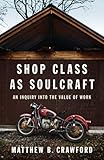
So my few loyal readers will know that given a choice, I'll always opt for working with my hands--I'll make it or fix it or refurbish it rather than buy it. Mostly because I just like doing things with my hands, and I tend to be pretty good at it.
But I've been reading Matthew Crawford's book Shop as Soulcraft lately, and I'm tempted to find even more virtues in the hands-on approach than I was. One important point he makes is that mastery over things is, for better or worse, a key component of our psychological makeup, such that it feeds our spirit (as Eli noted in her comment) and makes us happier, more empowered, and in the end truly creative. (Crawford has some scathing comments to make about the faux creativity of Build-a-Bears and customized Scions).
But the point I want to highlight here, is an implied point. He points out the difference between theoretical and conceptual knowledge (as exemplified by his physicist father) and empirical, real knowledge (as exemplified by his knowledge of his exasperatingly old and dodgy VW bug) and how these two types of knowledge part company. I can draw an analogy to the conceptual knowledge that I used to rely on for my work at the World Bank, and the hard-won empirical knowledge that social entrepreneurs on GlobalGiving use day in and day out.
Crawford's point is that life today provides much less of the latter than it used to, and that it is a dangerous thing--for the spirit, for sustainability, for our ultimate fates. While I don't see a concomitant shift in the development field--having come into existence really in the 20th century it is a product of its time and the lion's share of resources in development are put in service of solutions based on conceptual knowledge--I think the discounting of knowledge on the ground is equally dangerous in development. But like the motorcycle repair guy, most social entrepreneurs just go on about their business without much flash or renown. But they sure make the lives of their community better. They have to--they are right there and either they deliver results, or the community will move on.


